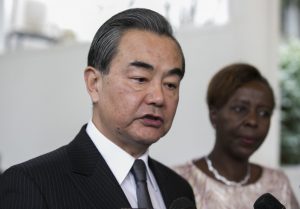Earlier this week, Chinese Foreign Minister Wang Yi embarked on a four-nation tour of Southeast Asia, his second such swing through the region since October, aiming to woo key regional partners just days before the Biden administration takes office in Washington.
The tour began on January 11 with a two-day stop in Myanmar, and will continue with stops in Indonesia, Brunei, and the Philippines. In each of these cases, infrastructure development and COVID-19 support are both likely to be high on the agenda.
Wang’s swing through Southeast Asia follows on the heels of a six-day tour of Africa, in which he visited five countries and pledged to strengthen cooperation in a range of sectors, including health, security, agriculture, and vital infrastructure.
It also follows an October tour that took Wang to Cambodia, Malaysia, Laos, and Thailand. As a result, the only Association of Southeast Asian Nations (ASEAN) state that Wang Yi has not visited since October is Vietnam, although he met for talks with Vietnamese Foreign Minister Pham Binh Minh in Guangxi province in August.
The latest tour of China’s top diplomat coincides with the final febrile days of the Trump administration, as the United States continues to grapple with the fallout from last week’s storming of the U.S. Capitol and the possibility of further disruptions ahead of Joe Biden’s inauguration on January 20.
In Myanmar, Wang will become the first foreign minister to visit the country since elections in November, which saw a thundering victory for State Counselor Aung San Suu Kyi and her National League for Democracy. COVID-19 cooperation is likely to top the agenda, along with the progress on the China-Myanmar Economic Corridor (CMEC), a clutch of important overland infrastructure projects linking China’s Yunnan province to the Indian Ocean. Since its inception in late 2017, progress on CMEC has been slow.
In a statement announcing Wang’s visit on January 15 and 16, the Philippine Department of Foreign Affairs said that he would meet with Foreign Secretary Teodoro Locsin in order “to consider ways to accelerate mutually beneficial cooperation, particularly in the priority areas of trade and investments, infrastructure development, and addressing the pandemic.”
Wang’s visit to Indonesia will also coincide with the rollout of Chinese-made COVID-19 vaccines in that country, where Wang is expected to discuss a similar range of issues with President Joko Widodo and other senior officials.
Coming on the cusp of a power transfer in Washington, and an expected change in diplomatic style under President-elect Biden and his team, Wang’s first two diplomatic tours of 2021 – to Africa and Southeast Asia – highlight the importance to China of its relationship with the nations of the Global South.
While the incoming Biden administration is likely to focus on shoring up ties with allies and partners in the industrialized West, China is moving to position itself as a more accommodating partner and less judgmental to the postcolonial nations of Asia and Africa, offering economic support alongside an avowed respect for national sovereignty and mutual non-interference.
Southeast Asia, which also lies in close proximity to China, is hence a doubly important region for Beijing at a time of escalating Sino-American tensions. As I wrote at the time of Wang’s October tour, the present spate of state visits are “aimed at communicating China’s steadfast commitment to ASEAN, as the economic downturn from COVID-19 begins to set in across the region. China’s aim is to position itself as a key partner in a post-COVID-19 world, both in terms of access to any coronavirus vaccine, and as a vital economic partner to the region.” In this aim, China is undoubtedly aided by the slow motion crisis in the United States.

































